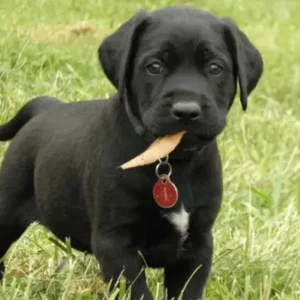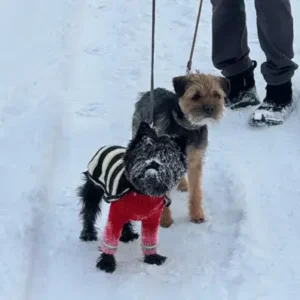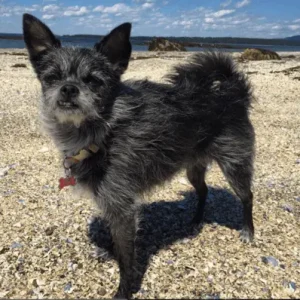Corgidor History/Origin
The Corgidor is thought to be an older hybrid dog breed than many realize. Although its exact origins are unclear, it’s believed that Cardigan Welsh Corgi and Labrador Retriever were intentionally bred for herding tasks in the early 1900s. While not officially recognized by the American Kennel Club, the Dog Registry of America acknowledges the breed.
Cardigan Welsh Corgi – Source: Britannica
Labrador Retriever- Source: Pixabay
Corgidor Personality
Corgidor is one of the dog breeds that inherit their personalities from both parent breeds. Welsh Corgis are known for being protective and alert, while Labrador Retrievers are friendly and affectionate. As a result, Corgidors make excellent family pets, being friendly toward strangers but protective of their loved ones.
They are great watchdogs and enjoy family outings, especially hiking. These dogs have an affectionate nature, and they are loving and patient with children of all ages.
- Potential Challenges
Corgidors are high-energy dogs that need regular exercise, so they may struggle in homes without sufficient activity or space to burn off energy. While they can adapt to apartment living, they thrive in larger spaces with yards where they can run and enjoy activities like playing fetch. Without proper physical and mental stimulation, they may become restless or bored. To keep them happy and well-adjusted, daily exercise is crucial.
Their outgoing personalities make them eager to engage with people and other pets. Additionally, their energy level requires consistent activities to keep them entertained. Enrolling them in puppy classes can also help with training and socialization, as their protective instincts can sometimes lead to over-guarding if not properly managed.
Corgidor Physical Appearance
The Corgidor, a Welsh and Lab Corgi mix, often resembles a Labrador with Corgi legs. It has a square head, almond-shaped eyes, a long muzzle, and smaller, high-set ears that flop down. The breed is shorter than it is long, a trait from the Corgi, but remains well-muscled.
- Size
Due to the significant height difference between their parent breeds, the Labrador Retriever and the Welsh Corgi, Corgidors can vary in size. Typically, they fall into the medium-sized dog category, with males often being slightly taller and heavier than females. On average, Corgidors weigh between 40 and 55 pounds and stand 12 to 23 inches tall at maturity.
- Coat color
Corgidor coats typically blend the traits of their Corgi and Labrador parents, both in texture and color. Their primary coat colors include brown, black, red, and tan. Some Corgidors have solid-colored coats, while others display a mix of colors and fur types. Their coat length usually ranges from short to medium.
Black Corgidor – Source: jackson_the_corgidor
Brown Corgidor- Source: pumpkinthecorgidor
White and Fawn Corgidor- Source: Pinterest
Corgidor Gender Differences
Male Corgidors generally grow slightly taller and heavier than females. While individual temperament often depends more on personality than gender, some suggest that males tend to be more playful and affectionate, though they can also be a bit rougher and more likely to wander. Females, on the other hand, are typically more even-tempered and less demanding, though they may experience occasional mood swings.
Corgidor Health
Corgidors can inherit some of the common health issues seen in their parent breeds, the Welsh Corgi and Labrador Retriever. While they are generally healthy dogs, it’s essential to provide proper care and schedule regular vet visits to catch any potential problems early. Here are some health concerns to be mindful of:
- Eye Problems: Corgidors may develop eye conditions such as cataracts or progressive retinal atrophy, which can lead to vision loss. Regular eye checkups and keeping their eyes clean can help detect and prevent these issues.
- Joint Dysplasia: Hip dysplasia and elbow dysplasia are common in both Corgis and Labradors, leading to joint pain and mobility issues. Maintaining a healthy weight and providing joint supplements can help reduce the strain on their joints and slow the progression of this condition.
- Ear Infections: Due to their floppy ears, Corgidors can be prone to ear infections, especially if moisture and debris get trapped. Regular ear cleaning and keeping their ears dry, particularly after swimming or baths, can help prevent infections.
- Back Problems: Corgidors, especially those with the shorter legs of a Corgi, may be at risk for spinal issues like intervertebral disc disease (IVDD). To reduce the risk, avoid letting them jump from high places and maintain a healthy weight to minimize strain on their spine.
- Obesity: Corgidors tend to gain weight, which can lead to various health problems such as joint strain and heart issues. To prevent obesity, stick to a controlled diet, monitor portion sizes, and ensure they get regular exercise.
- Skin Issues: They may experience skin problems like allergies or hot spots, which can cause itching and discomfort. Regular grooming, a balanced diet, and addressing any skin irritation early can help keep their skin healthy.
Corgidor Care and Grooming
Corgidors, a lively mixed-breed dog from the Corgi and Lab lineage, are prone to weight gain due to their high energy levels. Ensure your dog gets at least one solid half-hour to hour-long walk each day, along with a few active play sessions and shorter walks mixed in.
Daily checks for debris and pests in their ears are essential, and be sure to clean them as your vet recommends. Corgidors, or Corgi Lab mixes, also have fast-growing nails, so trim them before they become too long—typically once or twice a month. They shouldn’t be clicking against the floor, and your groomer can assist with this.
Maintaining your Corgidor’s oral care is essential for their health. Your veterinarian can offer guidance on dental care. Their coats are usually short to medium and require minimal grooming, with brushing once a week typically enough. Be prepared for excessive shedding, so investing in a vacuum cleaner may be a good idea.
Corgidors tend to thrive in cooler climates rather than warmer ones, as they can easily overheat. Always ensure they have a fresh supply of water available to keep them hydrated. Additionally, leash training your dog early on is crucial to help them stay calm and well-behaved during walks, especially in varying weather conditions.
Corgidor Rescue Groups
When considering adopting a Corgidor, it’s important to explore rescue options as many dogs need loving homes. Look for breed-specific rescues that focus on the parent breeds, the Corgi and Labrador Retriever, as they often have mixed breed dogs like Corgidors available for adoption. By choosing to rescue, you not only give a dog a second chance but also help reduce the number of pets in shelters.
Corgidor Price
The price of a Corgidor typically ranges from $600 to $2,000, depending on factors such as breeder reputation, pedigree, and location.
If you’re interested in purchasing a Corgidor, it’s essential to seek out reputable breeders who prioritize ethical breeding practices. This means they should focus on the health and temperament of their dogs, conduct necessary health screenings for the parent breeds, and provide a nurturing environment for the puppies.
Interesting Facts
- Given their Corgi lineage, Corgidors may retain strong herding instincts, which can manifest in behaviors like chasing or nipping at the heels of children and other pets.
Best For
Corgidors make excellent pets for individuals or families with a moderate-to-active lifestyle. Their friendly and outgoing nature makes them great companions for those who enjoy outdoor activities, such as hiking or playing fetch. They thrive in homes where they receive regular exercise and mental stimulation, making them ideal for active pet owners looking for a loyal and affectionate friend.
Top Names
| Male Corgidor Names | Female Corgidor Names |
| Max | Bella |
| Cooper | Daisy |
| Charlie | Luna |
| Oliver | Ruby |
| Leo | Zoey |
Feed/Nutrition
A Corgidor’s diet should be designed for a medium-sized, active dog, with about 3 cups of food per day. Since they can easily gain weight if overfed, it’s important to follow a consistent feeding schedule and avoid leaving food out all day.
Their dietary needs will change as they grow from puppies to adults, and later into their senior years. Additionally, mango can be given as an occasional treat, but be sure to remove the pit and skin, as these parts can be harmful.
For the best guidance on your Corgidor’s nutrition, consult your veterinarian, as individual factors like weight, energy, and health can vary.









 Cardigan Welsh Corgi – Source:
Cardigan Welsh Corgi – Source:  Labrador Retriever- Source:
Labrador Retriever- Source: 

 Black Corgidor – Source:
Black Corgidor – Source:  Brown Corgidor- Source:
Brown Corgidor- Source:  White and Fawn Corgidor- Source:
White and Fawn Corgidor- Source: 







